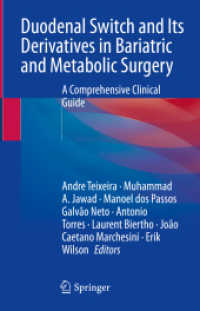- ホーム
- > 洋書
- > 英文書
- > Politics / International Relations
Full Description
In this book, Alec Stone Sweet and Jud Mathews focus on the law and politics of rights protection in democracies, and in human rights regimes in Europe, the Americas, and Africa. After introducing the basic features of modern constitutions, with their emphasis on rights and judicial review, the authors present a theory of proportionality that explains why constitutional judges embraced it. Proportionality analysis is a highly intrusive mode of judicial supervision: it permits state officials to limit rights, but only when necessary to achieve a sufficiently important public interest. Since the 1950s, virtually every powerful domestic and international court has adopted proportionality analysis as the central method for protecting rights. In doing so, judges positioned themselves to review all important legislative and administrative decisions, and to invalidate them as unconstitutional when such policies fail the proportionality test. The result has been a massive - and global - transformation of law and politics. The book explicates the concepts of 'trusteeship', the 'system of constitutional justice', the 'effectiveness' of rights adjudication, and the 'zone of proportionality'. A wide range of case studies analyse: how proportionality has spread, and variation in how it is deployed; the extent to which the U.S. Supreme Court has evolved and resisted similar doctrines; the role of proportionality in building ongoing 'constitutional dialogues' with the other branches of government; and the importance of the principle to the courts of regional human rights regimes. While there is variance in the intensity of proportionality-based dialogues, such interactions are today at the very heart of governance in the modern constitutional state and beyond.
Contents
1: Constitutions, Rights, and Judicial Power
2: Proportionality and Constitutional Governance
3: Emergence and Diffusion
4: All Things in Proportion? The United States
5: Constitutional Dialogues
6: Global Constitutionalism and Transnational Governance
Table of cases








